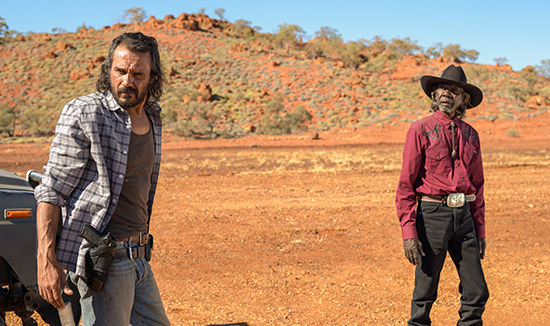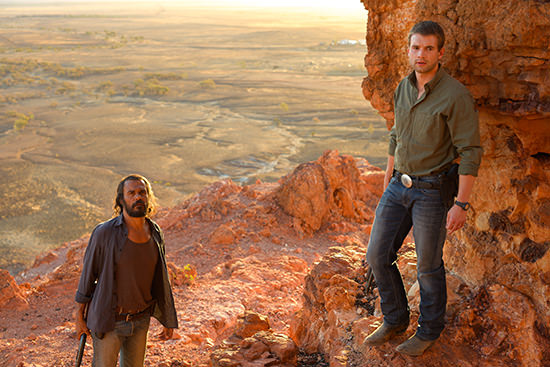Dust, myth & a new hero
Katerina Sakkas: Ivan Sen, Goldstone

Goldstone
There’s a lot of dust in Ivan Sen’s Goldstone: literal dust in the desert terrain of the film’s titular town, as well as the metaphorical variety, heard from characters who talk about “cleaning the dust away.” This accretion brings to mind an image of historical detritus that cannot be brushed off, a cultural legacy that’s foregrounded during the film’s opening credits that feature a series of photographs from Australia’s Gold Rush era. Over a sweeping instrumental score, shackled Indigenous men appear with shocking clarity, followed by images of the Chinese community at work, and white Australians at afternoon tea.
The music ceases and historical pictures are replaced by a shot of a car driving through a yellow landscape, heralding the return to the screen and the arrival in Goldstone of Detective Jay Swan (Aaron Pedersen), last seen in Sen’s 2013 thriller Mystery Road. Notably the worse for wear, he’s arrested by the makeshift town’s fresh-faced policeman, Josh (Alex Russell), for drink-driving, before being grudgingly released to begin investigating the disappearance of a young Chinese woman. Here as in Mystery Road, Swan’s inquiries start to expose something poisonous within the entire community. Goldstone might be small and relatively isolated, but the problems Swan must tackle, of exploitation and corruption stemming from postcolonialist greed and racism, are enormous and all too familiar in reality.

Goldstone
Sen is a versatile director who can move from the most meditative ‘art’ cinema (Beneath Clouds, 2002) through naturalism (Toomelah, 2011) to the skilled employment of suspense and action in his genre pieces featuring Jay Swan. But in all these films there’s a common socio-political thread of characters caught between worlds: a questioning of what it means to belong and whether it’s possible to escape your allotted place. In Goldstone, Sen takes Swan’s outsider status, as flawed but principled Indigenous lawman, and pushes it into mythic territory, intensified by his most explicit exploration of spirituality yet, centred on local elder Jimmy, played by David Gulpilil.
Perhaps this mythologising—though not a flaw in itself—and the number of problems Goldstone seeks to encompass makes the film’s approach to real victimisation seem at times superficial. For all the talk of dust, the film doesn’t feel viscerally dirty enough. The horror of sex trafficking is skirted around, while characters like David Wenham’s mine foreman and Jacki Weaver’s mayor, who with a penchant for baking and corruption is a cruder version of her truly frightening matriarch in Animal Kingdom (David Michôt, 2010), are too broadly drawn to be deeply menacing. Sen doesn’t utilise the intense close-ups of Mystery Road: that portrait-like scrutiny of faces behind which lurk potentially devastating secrets. The secrets in this mining town are fairly open ones. Swan and Josh know how the land lies; it’s largely a question of whether they can shift a few monoliths.
While Goldstone’s mythic quality might simplify some of its themes, it doesn’t reduce the impact of Jay Swan, whom Pedersen renders as layered and believable as he is archetypal. Along with ABC TV series Cleverman (2016), the Jay Swan films mark the long-overdue arrival of Indigenous (super) heroes, as well as narratives that grapple with contemporary injustices via the myth genre. Cleverman has been approved for a second series; I’m hoping Jay Swan will surface in another troubled town a few years hence.

Goldstone
Goldstone, writer-director Ivan Sen, cinematography, editing Ivan Sen, score Ivan Sen, Damien Lane, production design Matthew Putland; distributor Transmission Films, 2016
RealTime issue #133 June-July 2016






